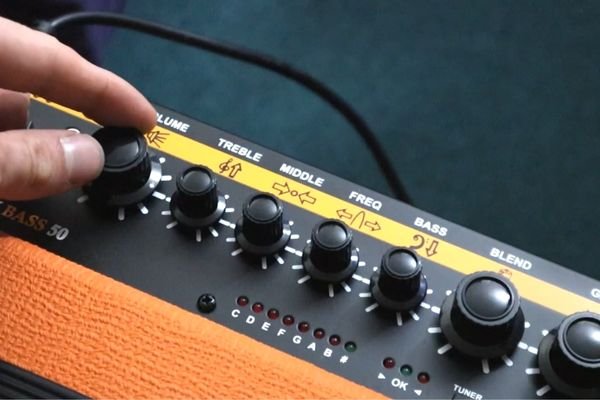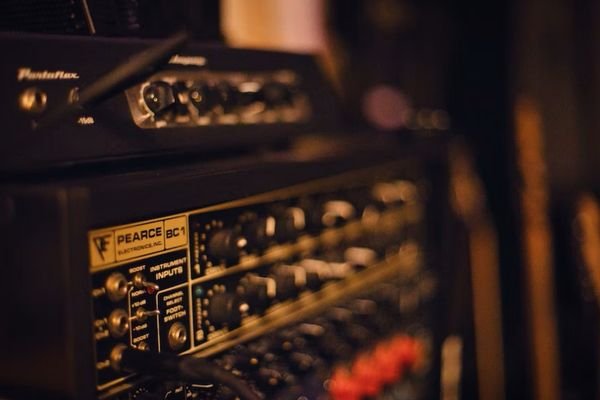It’s often intimidating to try something new, like playing through a bass amp. Can you play a guitar through a bass amp? Surprisingly, a bass amp can offer a whole new level of depth and tone for a guitar too. While playing the guitar through a bass amp, there are a whole lot of benefits, but at the same time, some drawbacks too. Let’s take a detailed peek at those and some essential tips for playing guitar through a bass amp. Let’s get started!
- Can You Play A Guitar Through A Bass Amp?
- Pros and Cons of Playing A Guitar Through A Bass Amp
- Is A Bass Amp The Same As A Guitar Amp?
- Can You Play Acoustic Guitar Through A Bass Amp?
- Is Playing An Electric Guitar Harmful On Bass Amp?
- How To Use Guitar Through Bass Amp: Step-by-step Guide
- Final Words: Can You Play A Guitar Through A Bass Amp
Can You Play A Guitar Through A Bass Amp?
Typically, bass amps are designed to handle lower frequencies, a hallmark of bass guitar. It can work wonder for guitars. In fact, I’ve tried with a bass amp; the result that I experienced is a unique and enhanced sound that is different from traditional guitar amps. A bass amp can enhance its sound quality by emphasizing the lower frequencies, resulting in a fuller and richer tone. In short, can you play a guitar through a bass amp? Yes, you can!
But there are some things to keep in mind when using a bass amp for a guitar, like making sure the amp is compatible with your guitar’s voltage. Some bass amps may not have the correct input for a particular guitar, and that might damage the guitar or the amp.

Pros and Cons of Playing A Guitar Through A Bass Amp
Here are some advantages and drawbacks to consider before you think of ‘can you play a guitar through a bass amp’:
Pros:
- Increased Power: Bass amps are typically more powerful than guitar amps. It can be particularly useful if you play in a loud or noisy environment or if you’re playing with other instruments that are also amplified.
- More Low-End: If you’re looking for a more low-end tone in your guitar, a bass amp is a great option. It’s especially useful if you’re playing heavy music or if you’re trying to create a deeper, more resonant sound.
- Tone: The tone of the bass amp, especially when it’s driven to its maximum volume, can produce a rich and deep tone that can fill up the room and give you a lot of presence.
Cons:
- Feedback: One of the major drawbacks of playing a guitar through a bass amp is the possibility of feedback. Because of the low frequencies that the bass amp can produce, it can cause a lot of feedback when you play at high volumes. It can be a real challenge, especially when you’re playing live.
- Reduced Clarity: If you’re playing through a bass amp, it can be difficult to hear individual notes in your playing. So, it becomes a little hard to play fast or complex passages or to hear your own mistakes.
- Muddiness: A bass amp can sometimes produce a muddy or indistinct tone. It’s because a bass amp is not optimized for the high frequencies produced by a guitar.
Is A Bass Amp The Same As A Guitar Amp?
A bass amp and a guitar amp are not similar at all. Let’s see the key differences between the two and why it is important to choose the right one for their instrument.
Frequency Range: A guitar amp is designed to handle the frequency range of a guitar, which typically ranges from 80Hz to 12kHz. A bass amp, on the other hand, is designed to handle the lower frequency range of a bass guitar, ranging from 20Hz to 5kHz.
Speaker Size and Number: Bass amps have larger speakers (10-15 inches) to deal with the lower frequencies of a bass guitar better, while a guitar amp has a smaller speaker (5-12 inches). On top of it, bass amps usually have more than one speaker, while guitar amps typically have one speaker.
Power Output: Bass amps are all about delivering high wattage, while guitar amps are designed for a lower wattage output. You’ll typically find that a bass amp has a power output of around 150-350 watts, while a guitar amp will have a power output of around 10-120 watts. The difference in wattage is designed to suit the different needs of the instruments they are amplifying.
Preamp and Tone Controls: Bass amps typically have more advanced preamp and tone controls, allowing bassists to sculpt their sound more precisely. In contrast, guitar amps usually don’t have that many tone controls. Guitarists usually rely more on pedals and effects to shape their sound.
Impedance: Impedance is the measure of resistance that the electrical signals encounter as they pass through the amp. A lower impedance value means the amp will be able to handle more power, whereas a higher impedance value reduces the amount of power the amp can handle to provide a cleaner tone. The resistance affects the overall tone and response of your sound. Bass amps typically have an impedance of 4 ohms, while guitar amps typically have an impedance of 4 or 8 ohms.

Can You Play Acoustic Guitar Through A Bass Amp?
Can you play a guitar through a bass amp? Yes, you can, and that includes both acoustic and electric guitars. Perhaps your band has a bass amp for the bass player but no amp for your acoustic. Or maybe you only have access to a bass amp. Whatever the situation there is, it is possible to play an acoustic guitar through a bass amp, but you need to be aware of a few key factors.
Firstly, the bass amp you’re using needs to be powerful enough to handle the output of the acoustic guitar. Most bass amps are designed to handle the lower frequencies of a bass guitar. So, it’s important to choose a bass amp that has a good high-frequency response.
Secondly, you’ll need to adjust the tone controls on the bass amp to suit the acoustic guitar. A good starting point is to set the bass and treble controls to around 12 o’clock, giving you a balanced tone that can be adjusted as needed.
Tips: If you plan on playing your acoustic through a bass amp on a regular basis, go for a bass amp that has a built-in direct input for acoustic guitars, like Fender Bassman.
See Also: How Much Does A Good Guitar Cost
Is Playing An Electric Guitar Harmful On Bass Amp?
What happens when you plug an electric guitar into a bass amp? Nothing much. Playing an electric guitar through a bass amp won’t cause any harm because the bass amp can handle the mid and high-frequency notes of the guitar. The high notes of an electric guitar do not have enough power to damage the bass amp. So, even if the bass amp doesn’t have the optimal sound for higher tones, it won’t be harmed.

How To Use Guitar Through Bass Amp: Step-by-step Guide
Now we know the answer to ‘can you play a guitar through a bass amp.’ But how to set it up? Here’s a step-by-step guide on how to use a bass amp with your guitar:
Step 1: Set To A Clean Channel
Make sure the amp is set to a clean channel before you start playing, especially if the amp has multiple channels. It will ensure that the sound is uncolored (not distorted in any way), and you’ll be able to hear the true tone of your guitar.
Step 2: Connect The Guitar To The Amp
Find the input jack on the bass amp and plug one end of the instrument cable into the jack and the other end into the output of your guitar. Ensure that the cable is securely plugged in on both ends.
Step 3: Set The Gain and Volume
The gain on the bass amp controls the level of pre-amp distortion, while the volume controls the overall volume level. Start with the gain low and gradually increase it until you reach the desired level of distortion. Then, adjust the volume to a comfortable level.
Step 4: Adjust The EQ Settings
Adjust the EQ settings to shape the tone to your liking. For example, you may want to reduce the low-end frequencies to avoid a muddled tone or boost the mid-range frequencies to emphasize the character of your guitar.
Step 5: Find Your Tone
Experimenting with different settings and combinations will let you find the tone that works best for your setup. For example, try playing with different pickup settings on your guitar or adjusting the tone controls on your guitar or amp.
Final Words: Can You Play A Guitar Through A Bass Amp
The answer to the question “Can you play a guitar through a bass amp?” is a resounding YES! However, if you’re looking for a cleaner, more defined tone, a guitar amp might be a better fit. But if you’re searching for a rich, punchy sound with extra low-end, a bass amp might be the right thing for you.
